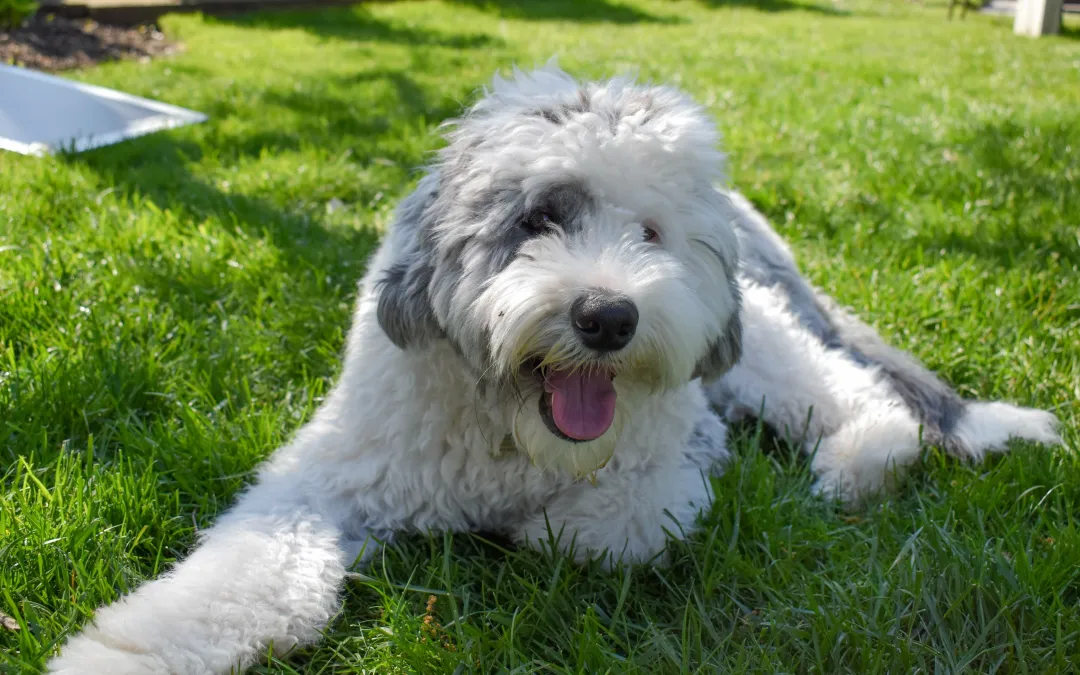Are you wondering, “Is a Sheepadoodle a good dog” for your home? Choosing the right dog breed can transform your daily life, bringing joy and companionship tailored to your lifestyle.
As a Sheepadoodle enthusiast, I understand the importance of finding a pet that fits your family, space, and energy level. With insights from breed experts and real owners, I’ll share practical advice to help you decide if this fluffy, lovable hybrid is your perfect match.
Sheepadoodles, a cross between an Old English Sheepdog and a Poodle, are known for their intelligence, affectionate nature, and low-shedding coats. Whether you’re seeking a family-friendly dog or a cuddly companion for your apartment, the right Sheepadoodle can be a game-changer.
In this guide, you’ll discover the temperament, care needs, pros and cons, and tips to ensure a Sheepadoodle thrives in your home.
Let’s dive in!
What Is a Sheepadoodle
A Sheepadoodle is a mix between an Old English Sheepdog and a Poodle, making it a hybrid dog breed. This mix combines the friendly, gentle nature of the Sheepdog with the intelligence and low-shedding coat of the Poodle. Sheepadoodles first gained popularity in the early 2000s as people looked for family-friendly dogs that are also good for allergy sufferers.
Sheepadoodles come in a few different sizes, depending on whether the Poodle parent was standard, miniature, or toy. Most commonly, Sheepadoodles are medium to large dogs, weighing between 45 to 80 pounds. Their appearance is a charming blend of fluffy and curly fur, often black and white or gray and white, with a soft, sometimes wavy coat that needs regular care to keep looking its best.
Sheepadoodle Temperament Are They a Good Fit for You

Sheepadoodles are known for their friendly and gentle nature, making them great family dogs. They are smart, eager to please, and usually get along well with kids and other pets. One key trait is their protective instincts—they tend to be alert and can be good watchdogs without being overly aggressive. They also show some herding behavior, which means they might try to gently herd family members, especially kids.
If you’re wondering whether a Sheepadoodle fits your lifestyle, consider that they thrive on social interaction and mental stimulation. According to dog expert Dr. Linda Michaels, “Sheepadoodles combine the calm, loyal nature of the Old English Sheepdog with the intelligence of the Poodle, making them adaptable and loving companions.”
In short, if you want a social, protective, and trainable dog that fits well into a family environment, a Sheepadoodle could be an excellent match.
Pros of Owning a Sheepadoodle

Sheepadoodles bring a lot of great qualities to the table, making them a popular choice for many dog lovers. Here’s why owning one can be a fantastic experience:
-
Great Family Pets: Their friendly and gentle nature makes Sheepadoodles excellent companions for families with kids. They are patient and loving, often forming strong bonds with all family members.
-
Low Shedding Coat: Thanks to their Poodle heritage, Sheepadoodles tend to shed less than many other breeds. This makes them a good option for allergy sufferers or anyone wanting a cleaner home.
-
Intelligent and Trainable: These dogs pick up commands quickly and enjoy learning new tricks, which makes training easier and more enjoyable.
-
Social and Affectionate: Sheepadoodles love being part of the family and usually get along well with other pets and strangers.
-
Protective but Not Aggressive: They have a natural watchdog instinct, alerting you to visitors while maintaining a friendly demeanor.
-
Active and Playful: If you lead an active lifestyle, Sheepadoodles are happy to join in walks, hikes, or play sessions without complaints.
Owning a Sheepadoodle means having a loyal, loving, and adaptable friend who fits well into many lifestyles, especially those valuing companionship and moderate activity.
Cons of Owning a Sheepadoodle
While Sheepadoodles are great dogs, they’re not perfect for everyone. Here are some potential downsides to consider:
-
High Energy Levels: Sheepadoodles need plenty of exercise. Without regular play and walks, they can get bored and act out.
-
Grooming Needs: Their curly or wavy coats require consistent grooming to avoid mats and tangles. This means frequent brushing and occasional trips to a professional groomer.
-
Training Required: Though smart, Sheepadoodles can be stubborn. Early and ongoing training is important to keep their behavior in check.
-
Potential Health Issues: Like many mixed breeds, they can inherit health problems from their parents, such as hip dysplasia or eye conditions. Regular vet check-ups are a must.
-
Shedding Can Vary: While often labeled hypoallergenic, some Sheepadoodles do shed more than expected, which might not be ideal for all allergy sufferers.
-
Not Ideal for Small Apartments: Due to their size and energy, they may struggle in tight living spaces without enough room to move.
Before deciding on a Sheepadoodle, it’s good to weigh these points against your lifestyle to make sure this dog is a good fit for you.
Are Sheepadoodles Good for Your Lifestyle
Sheepadoodles can be a great match depending on your living situation and activity level.
Families with Kids
These dogs are known for being gentle and friendly with kids. Their playful and patient nature makes them a solid choice for households with children. Just remember, their size means supervision is key around very young kids.
Apartment Dwellers
Sheepadoodles are medium to large dogs that need space to move around. While they can adapt to apartment living, they require daily exercise to stay happy and healthy. If you live in an apartment, make sure you have time for several walks and play sessions outdoors.
Allergy Sufferers
Since Sheepadoodles can inherit the Poodle’s low-shedding coat, they are often considered hypoallergenic. This makes them a better option for people with mild allergies. Still, spend time with a Sheepadoodle before committing, as coat types can vary.
First Time Owners
Sheepadoodles are intelligent and trainable, which is great for beginners. However, they do need consistent training and socialization. Being prepared to invest time in training is important to avoid behavioral problems.
Active Individuals
If you’re active and love outdoor activities, a Sheepadoodle will keep up. They enjoy daily exercise like runs, hikes, and playtime and thrive with an active lifestyle. This breed is not well-suited for a sedentary household.
In short, Sheepadoodles fit well with families and active people who can meet their exercise and social needs. Apartment living and allergies are manageable if you’re prepared to give them proper care and attention.
Care Tips for Sheepadoodle Owners

Taking care of a Sheepadoodle means staying on top of their exercise, grooming, training, health, and diet. Here’s what you need to know:
Exercise
- Sheepadoodles are active dogs who love to move. Aim for at least 60 minutes of exercise daily.
- Mix up walks, playtime, and mental challenges like puzzle toys to keep them happy.
Grooming
- Their coat is thick and curly, needing regular brushing 3-4 times a week to prevent mats.
- Plan professional grooming every 6-8 weeks.
- Check ears and trim nails regularly to avoid infections.
Training
- Sheepadoodles are smart and eager to learn but need consistent, positive training.
- Socialize them early to prevent herding or protective behaviors from becoming issues.
- Use rewards and patience—harsh methods don’t work with this sensitive breed.
Health
- Watch for common Sheepadoodle health concerns like hip dysplasia and eye problems.
- Regular vet check-ups and a good preventive care routine are essential.
- Keep up with vaccinations and parasite control.
Diet
- Feed a high-quality, balanced dog food that fits their age, size, and activity level.
- Avoid overfeeding to prevent obesity, which can stress their joints.
- Fresh water should be available at all times.
By sticking to these care basics, your Sheepadoodle will stay healthy, happy, and a great companion for years to come.
Real Sheepadoodle Owner Experiences
Many Sheepadoodle owners have shared positive stories about their pets’ friendly and loyal nature. They often mention how these dogs quickly become a part of the family due to their loving temperament and playful spirit. Owners say Sheepadoodles are great with kids and tend to get along well with other pets, which makes them a fantastic choice for families.
At the same time, some owners note that Sheepadoodles need consistent training and plenty of exercise to stay happy and healthy. Without regular walks and mental stimulation, these dogs can become bored and a bit mischievous. Grooming is another common topic—many owners emphasize the importance of routine brushing to keep their Sheepadoodle’s coat tangle-free and looking its best.
Overall, real Sheepadoodle owners appreciate how well their dogs fit into active lifestyles and family homes. They often recommend connecting with local Sheepadoodle communities or the Sheepadoodle platform to exchange care tips and share experiences. This support helps new owners get the most out of life with their Sheepadoodle.
Where to Find a Sheepadoodle
When looking for a Sheepadoodle, you have two main options: adoption or breeders.
Adoption
Adopting a Sheepadoodle can be a great choice if you want to give a dog a second chance. Check local shelters and breed-specific rescues. Websites like Mini Sheepadoodle Adoption list available Sheepadoodles for adoption in various states. Adoption fees are usually lower than buying from breeders, but keep in mind availability can vary.
Breeders
If you’re set on getting a puppy, go through reputable Sheepadoodle breeders who prioritize health and temperament. Look for breeders who provide health clearances and socialization support. Costs for Sheepadoodle puppies in the U.S. typically range from $1,500 to $3,000 depending on pedigree and location.
Cost considerations
Remember to include long-term costs like grooming, training, and vet visits when budgeting for a Sheepadoodle. Puppies need time and investment, so consider these factors carefully before choosing.
Local tip
In the U.S., states like Michigan and Ohio have active Sheepadoodle communities and breeders, as well as adoption groups. For example, Sheepadoodle Adoption Michigan can be a helpful resource if you live nearby. Connecting with local Sheepadoodle owners or clubs can also guide you in finding trusted breeders or adoption options in your area.

